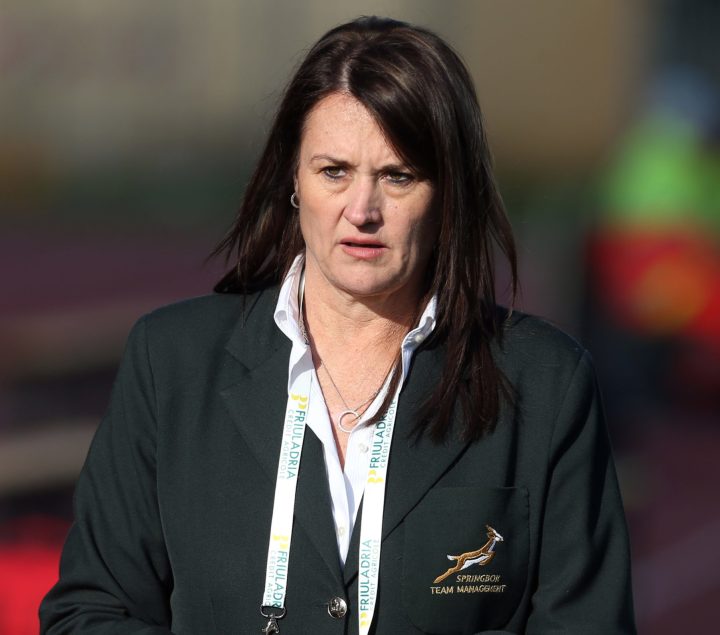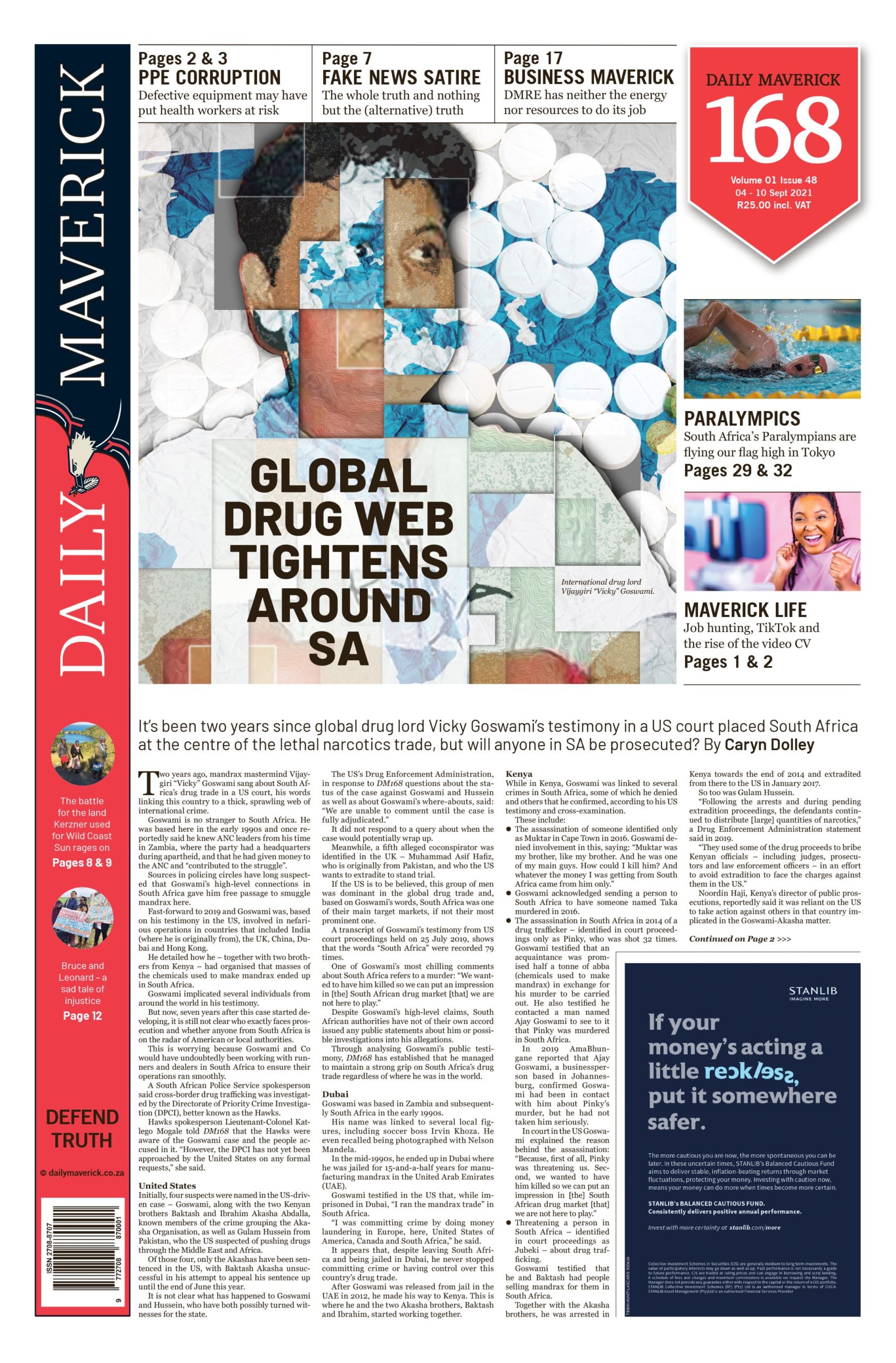DM168 SPORT
‘Mother of the Springboks’ Annelee Murray deserves to be recognised as the heart of the rugby family

Public relations manager Annelee Murray is accustomed to questions about a woman’s role in a male-dominated environment such as professional rugby.
First published in the Daily Maverick 168 weekly newspaper.
Rassie Erasmus entered the press conference room at the International Stadium Yokohama and greeted the media with a megawatt smile. Siya Kolisi followed the Springbok coach, carrying the Webb Ellis Cup in two hands. As Kolisi placed the biggest prize in rugby on the top table, a British journalist tapped me on the shoulder and referred me to an image on their phone.
The first black South African captain, surrounded by jubilant Springbok teammates and management members, was thrusting the trophy into the sky. A woman was standing to Kolisi’s right.
“Who is she,” the journalist asked, “and what right does she have to be there?”
As the story goes, public relations manager Annelee Murray was nudged towards the front of the podium by senior players such as Pieter-Steph du Toit and Duane Vermeulen. “Go on, Annelee,” Du Toit assured her, “you deserve to be there.”
The players felt that Murray, as the longest-serving member of the management group and one of the chief facilitators of a happy team culture, should be front and centre for an iconic moment in South African rugby history.
“The Mother of the Springboks”, as she became affectionately known over a period of two decades and 244 Tests, deserved to be represented as the heart of the team.
A woman in a male environment
Murray is accustomed to questions about a woman’s role in a male-dominated environment such as professional rugby. On many occasions, the players have answered these questions on her behalf, going out of their way to explain how she has contributed to the group’s success.
Murray’s new book, The First Lady of Springbok Rugby, explores these themes. The accomplished public relations manager provides a unique take on a familiar sporting story, and past captains and current senior players offer insights into the role she played in building an inclusive and honest team culture.
“So many people have asked me what it’s like to work in a male-dominated sport and in a male-dominated environment,” Murray says of her motivation to write a book.
“I also wanted to give fans a better idea of that world, in terms of what happens on a day-to-day basis. There’s so much more to it than what you see on game day. Ultimately I want people to fall in love with Springbok rugby.”
Murray grew up in a sports-mad family on a farm in the Eastern Cape. Her dad Peter played for Eastern Province, and her mom Penny played hockey at the highest level. While she always had a passion for sport, she could not have foreseen the role she would play in the Bok set-up for the better part of 20 years.
After Harry Viljoen was appointed head coach in 2001, he set out to change the way the world perceived South African rugby. Up to that point, Murray had worked across all the teams at SA Rugby. After Viljoen sold his vision to the suits, however, Murray was recruited to the Bok management team on a full-time basis.
“Harry wanted to run the team like a business,” recalls Murray.
“He was big on professionalism, and big on players living up to a high standard both on and off the pitch. In many ways, he was ahead of his time, because that’s how the game operates today.”
Link between Boks and Mandela
Viljoen wanted to strengthen the relationship between the team and former state president Nelson Mandela – the icon who had played such a massive role in the Boks’ 1995 World Cup triumph.
Early in his tenure, Viljoen called Murray and instructed her to set up a meeting with Madiba.
“I eventually got hold of his private secretary, Zelda la Grange. We had an instant connection and later became friends.
“Zelda became a sounding board for me over the years. Obviously I could never compare what I do for the Boks to what she did for Madiba, one of the greatest statesmen the world has ever seen, but she was the gatekeeper for the president, and I was the gatekeeper for the Springboks.”
In 2004, after Jake White succeeded Rudolf Straeuli as head coach and SA Rugby attempted to rebuild its image in the wake of Kamp Staaldraad and a disastrous 2003 World Cup campaign, Murray received a call from La Grange. She wanted to know whether White and Murray were available for lunch at the presidential residence in Cape Town.
“It was already 12pm, so I assumed that Zelda was calling ahead to arrange the lunch for a future date.
“‘When?’ I asked her. ‘In half an hour,’ she replied.
“We went to Madiba’s house and the four of us sat at a small kitchen table. He was amazing, addressing us by our first names, asking us about ourselves and telling the most wonderful stories.
“I met him a few times after that. After each meeting, I would go away from the conversation believing that I could accomplish anything. That’s the effect he had on people.”
On the eve of a Test against Australia at Ellis Park in 2005, La Grange called to say that the president would like to attend the match.
“There was a great scurry to get everything organised for his arrival. Security wanted him seated in a specific spot, and everything had to be done a certain way.
“When he arrived, he informed everyone that he wasn’t happy with his seat and promptly headed down the tunnel to chat to the Bok team, who were heading back to the change room after their warm-up.
“Wallabies captain George Gregan was also in the tunnel at the time. He just looked at me and said: ‘Mate, it’s going to be a long day for us.’ The Boks won 33-20.”
Going above and beyond
Murray developed a reputation in the South African rugby community for going above and beyond the call of duty. Whether it was managing travel arrangements for the players and their families or delivering smaller, more personal items – such as a birthday cake for a player – she took it all in her stride.
“From the start, I realised that as a female working in a male-dominated environment, I needed to get things right the first time. I had to do things better and quicker than anyone else to stand out. And I suppose that’s how the respect for me and my role grew.
“My nature is to help people. Caring for others is part of my make-up. If I could help a sponsor or a journalist in addition to my role with the team, I would go out of my way. I said from the start that ‘No’ is not in my vocabulary. I had to find a solution to a problem,” she says.
Former Bok captain John Smit as well as Test centurions such as Tendai “Beast” Mtawarira and Percy Montgomery have highlighted Murray’s protective attitude towards the players. When she was initially described as the “Mother of the Springboks”, however, she didn’t enjoy the nickname.
“I never thought of myself that way. Then one day, when I was organising a visa for Duane Vermeulen, I noticed that his mother was actually younger than me. I thought, okay, I get it now.
“It’s actually a term of endearment, and if I reflect on what I did, the description fits. I spent a lot of time with players over the years. Often they needed someone to talk to about their problems. I quickly realised that if I could take care of them, they could take care of their job a lot better.
“I’m not trained to be a psychologist or a mental coach or anything like that, but you can always try your best to care for other people. Sometimes the coaches accused me of mollycoddling the players, but the reality is that we all have issues.”
While Murray’s primary role was PR, she went out of her way to assist in the day-to-day scheduling and logistics. She was also part of the move to involve the players’ families in the set-up as much as possible.
“Sure, the wives and kids could come to the games, but I felt that was not enough. When they have the opportunity to spend more time with their loved ones, they are happier and you can see how that impacts their playing performances too.”
Transformation and diversity
Murray often compares White and Erasmus, the two coaches who won the World Cup during her 20-year tenure with the team.
After his appointment as the head coach in 2018, Erasmus tackled the subject of transformation with an unprecedented honesty. The team as well as the nation responded.
The 1995 World Cup is celebrated as a watershed for South African rugby, given the way Nelson Mandela and the Boks combined to bring the nation together. The 2018 season could also be viewed as a turning point, though, given the impact the team made on and off the field.
Murray agrees. “Rassie’s not scared to make bold calls. He said that we needed to transform and win. The squad and management team was very diverse – and there were also as many as four females in the latter group for the first time. Diversity is definitely a strength, as it encourages the players to work with all types of people and it challenges their thinking.”
While Murray has left the Bok team to focus on other opportunities, her legacy lives on. Through her work with one of the biggest teams in world rugby, she has paved the way for others to follow.
“There was a wonderful moment at the 2007 World Cup when Eddie Jones’s daughter Chelsea, who was 14 or 15 at the time, told me that she wanted to follow in my footsteps,” Murray says.
“Chelsea went on to work for different rugby teams and eventually Australian rugby. It felt great to have made such an impact on someone’s life.” DM168
This story first appeared in our weekly Daily Maverick 168 newspaper which is available for R25 at Pick n Pay, Exclusive Books and airport bookstores. For your nearest stockist, please click here.





















 Become an Insider
Become an Insider
Thank you for this behind the scenes insight. Behind every successful man/team stands a hero-maker and Murray is clearly a powerful hero in her own right!
Respect, Annelee. A hard job done with a soft heart. We need more like you.